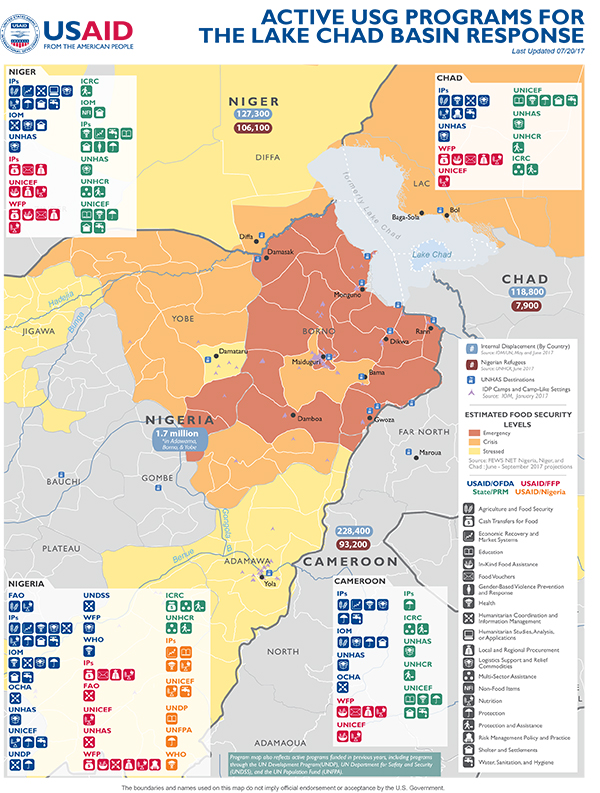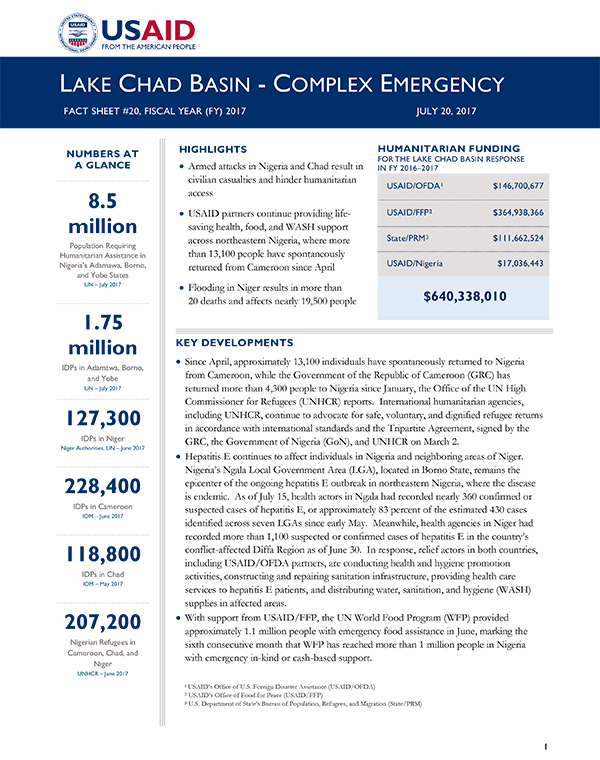- What We Do
- Agriculture and Food Security
- Democracy, Human Rights and Governance
- Economic Growth and Trade
- Education
- Ending Extreme Poverty
- Environment and Global Climate Change
- Gender Equality and Women's Empowerment
- Global Health
- Water and Sanitation
- Working in Crises and Conflict
- Disaster Assistance
- Political Transition Initiatives
- Conflict Mitigation and Prevention
- Countering Violent Extremism
- Disaster Risk Reduction
- Peacebuilding and Reconciliation
- Providing Safe & Secure Environments for Development
- Recovering From Crisis
- Resilience
- Tech Challenge for Atrocity Prevention
- World Humanitarian Day
- U.S. Global Development Lab
July 20, 2017
Highlights
- Armed attacks in Nigeria and Chad result in civilian casualties and hinder humanitarian access
- USAID partners continue providing life-saving health, food, and WASH support across northeastern Nigeria, where more than 13,100 people have spontaneously returned from Cameroon since April
- Flooding in Niger results in more than 20 deaths and affects nearly 19,500 people
Lake Chad Map - 07-20-2017 ![]() (pdf - 551k)
(pdf - 551k)
Numbers At A Glance
8.5 million
1.75 million
127,300
228,400
118,800
207,200
Humanitarian Funding
For the Lake Chad Basin Response
| USAID/OFDA | 146,700,677 |
| USAID/FFP | $364,938,366 |
| State/PRM | $111,662,524 |
| USAID Nigeria | $17,036,443 |
| Total | $640,338,010 |
KEY DEVELOPMENTS
Since April, approximately 13,100 individuals have spontaneously returned to Nigeria from Cameroon, while the Government of the Republic of Cameroon (GRC) has returned more than 4,300 people to Nigeria since January, the Office of the UN High Commissioner for Refugees (UNHCR) reports. International humanitarian agencies, including UNHCR, continue to advocate for safe, voluntary, and dignified refugee returns in accordance with international standards and the Tripartite Agreement, signed by the GRC, the Government of Nigeria (GoN), and UNHCR on March 2.
Hepatitis E continues to affect individuals in Nigeria and neighboring areas of Niger. Nigeria’s Ngala Local Government Area (LGA), located in Borno State, remains the epicenter of the ongoing hepatitis E outbreak in northeastern Nigeria, where the disease is endemic. As of July 15, health actors in Ngala had recorded nearly 360 confirmed or suspected cases of hepatitis E, or approximately 83 percent of the estimated 430 cases identified across seven LGAs since early May. Meanwhile, health agencies in Niger had recorded more than 1,100 suspected or confirmed cases of hepatitis E in the country’s conflict-affected Diffa Region as of June 30. In response, relief actors in both countries, including USAID/OFDA partners, are conducting health and hygiene promotion activities, constructing and repairing sanitation infrastructure, providing health care services to hepatitis E patients, and distributing water, sanitation, and hygiene (WASH) supplies in affected areas.
With support from USAID/FFP, the UN World Food Program (WFP) provided approximately 1.1 million people with emergency food assistance in June, marking the sixth consecutive month that WFP has reached more than 1 million people in Nigeria with emergency in-kind or cash-based support.
REGIONAL
An estimated 13,100 people have spontaneously returned to northeastern Nigeria from Cameroon since April, UNHCR reports. Unconfirmed reports indicate that the majority of spontaneous returnees are sheltering in internally displaced person (IDP) camps or informal sites and have yet to return to areas of origin, while approximately 1,300 people have reportedly returned to Cameroon after arriving in Nigeria. In addition to spontaneous returns, GRC authorities returned more than 4,300 people to northeastern Nigeria from January–June despite repeated advocacy efforts by the international humanitarian community, according to UNHCR.
In recent weeks, UNHCR and other relief agencies have expressed concern regarding returns to locations where humanitarian actors are unable or unprepared to provide basic services, emphasizing that returns to areas of origin must be safe, dignified, and voluntary. Following an early July trip to Nigeria, UNHCR Assistant High Commissioner for Protection Volker Türk visited Cameroon during the week of July 17 to advocate that the GRC adhere to the principle of non-refoulement and ensure that access to asylum is guaranteed to all persons seeking protection.
In early August, members of the Tripartite Commission plan to meet in Nigeria’s capital city of Abuja to discuss measures for facilitating voluntary returns in accordance with international standards, as well as steps for creating favorable conditions for returns to areas of origin in northeastern Nigeria.
NIGERIA
On July 17, a person-borne improvised explosive device (PBIED) attack in Borno’s city of Maiduguri resulted in at least eight deaths and injured approximately 20 people, international media report. The attack follows a series of PBIED attacks in Maiduguri on July 11 that resulted in at least 18 deaths, as well as a PBIED attack at the University of Maiduguri on July 6, which marked the eighth PBIED incident recorded in the vicinity of the university since January.
From early May to July 15, health actors reported more than 400 suspected or confirmed cases of hepatitis E, including at least four deaths, in Borno’s Askira Uba, Bayo, Chibok, Gubio, Mobbar, Monguno, and Ngala LGAs, according to the Borno State Ministry of Health. Hepatitis E, which is generally transmitted through contaminated drinking water, is endemic to Nigeria. Health actors have recorded the highest incidence of hepatitis E—nearly 360 cases—in Ngala. In response, USAID/OFDA is supporting the UN World Health Organization (WHO) and other relief organizations to provide health care and case management services, distribute medical supplies to hospitals, and conduct disease surveillance and hygiene promotion activities in affected areas.
With USAID/OFDA funding, a non-governmental organization (NGO) is providing WASH supplies and services to IDPs and host community members in Borno’s Jere, Konduga, Mafa, and Maiduguri Metropolitan Council (MMC) LGAs. In recent months, the NGO has distributed hygiene kits, waste collection bins, and other WASH supplies to vulnerable households, as well as rehabilitated latrine blocks in three IDP camps. In Borno’s Damboa and Dikwa LGAs, the NGO is also is desludging latrines and conducting hygiene promotion campaigns in IDP camps and host communities.
Between June 26 and July 9, a USAID/OFDA partner provided health consultations to approximately 2,500 people and reproductive health care services to 250 women in Dikwa and Ngala. During the same period, the partner educated an estimated 1,250 people in Ngala’s International School IDP camp on safe hygiene practices, including providing information on mitigating the spread of the ongoing hepatitis E outbreak in northeastern Nigeria. In Dikwa, the organization supported community volunteers to construct drainage and sanitation infrastructure in Kamcheji camp and rehabilitated a water point in Mohammed Kyari camp, increasing access to safe drinking water for approximately 5,000 IDPs sheltering at the site.
Nigeria’s May-to-October rainy season is impacting road access in some areas of northeastern Nigeria, while poorly maintained infrastructure and maritime worker strikes at Lagos Port are negatively affecting imports, including WFP shipments. WFP continues to identify measures to mitigate transportation challenges at the port, including the potential diversification of arrival terminals.
In June, USAID/FFP partner WFP provided emergency food assistance to approximately 1.1 million people, or nearly 85 percent of the UN agency’s target population, in Adamawa, Borno, and Yobe states. Approximately 927,000 people, predominately IDPs residing in camps or host communities, received in-kind food assistance, while approximately 171,000 people in areas where markets are functioning received cash-based food assistance. WFP also provided emergency food assistance to 16,500 people who recently returned from Cameroon to Borno’s Bama, Gwoza, and Ngala LGAs.
With support from USAID/FFP, a relief organization reached more than 102,000 people in Borno with cash-based and in-kind food assistance during June. The USAID/FFP partner also installed water taps and supplied containers at 40 communal kitchens used for mother-to-mother malnutrition prevention activities, including cooking demonstrations using nutrient-enriched foods.
CAMEROON
As of mid-May, Cameroon’s Far North Region was hosting more than 228,000 IDPs, the International Organization for Migration (IOM) reports. While the figure represents an increase of nearly 5,000 people since March, IOM attributes the increase to improved access and data collection methods. According to IOM, Far North is also hosting nearly 32,500 unregistered refugees.
CHAD
Insecurity continues to hinder humanitarian access and contribute to protection concerns in Chad’s Lac Region. From early May to early July, the UN Office for the Coordination of Humanitarian Affairs (OCHA) recorded more than 10 attacks on villages near Chad’s borders with Niger and Nigeria. Armed actors killed at least 15 people, kidnapped civilians, stole livestock, and destroyed property. The attacks also limited humanitarian access to Lac’s Kaiga Kindjiria and Tchoukoutalia areas, where an estimated 15,000 displaced persons reside, the UN reports.
On July 3, the Kingdom of Saudi Arabia (KSA) announced the delivery of 72 metric tons of dates to WFP in Chad. According to WFP, the in-kind food assistance will benefit approximately 20,000 children in western Chad.
NIGER
From January–June, health actors in Niger recorded more than 1,100 suspected or confirmed cases of hepatitis E, including 34 associated deaths, in five of Diffa’s six districts, the UN reports. In response, humanitarian agencies are distributing WASH supplies, improving access to safe drinking water, conducting hygiene education sessions, and providing case management and health care services in affected areas.
Severe flooding during Niger’s June-to-October rainy season had affected nearly 19,500 people and resulted in more than 20 deaths as of July 10, OCHA reports. Flooding has also killed thousands of livestock, including nearly 4,000 cattle in Tahoua Region’s Abalak and Tchintabaraden departments, and increased the risk of waterborne illnesses. An estimated 157,000 people are vulnerable to flooding in Niger in 2017, the UN reports.
On July 19, the European Commission announced a €4 million—or approximately $4.5 million—contribution to WFP and implementing partners to conduct malnutrition prevention interventions in Niger. The funding will enable WFP to support local farmers to increase the quality and quantity of nutritious foods, improve dietary diversity, and expand livelihood opportunities in affected areas.
CONTEXT
Following escalated violence in northeastern Nigeria, the GoN declared a state of emergency in Adamawa, Borno, and Yobe in May 2013. Between 2013 and 2015, Boko Haram attacks generated significant displacement within Nigeria and eventually to the surrounding countries of Cameroon, Chad, and Niger. As Boko Haram expanded its reach in Nigeria, controlling territory and launching attacks in neighboring countries, the scale of displacement continued to increase, and deteriorations in markets and loss of livelihoods exacerbated conflict-related food insecurity.
By early 2016, advances by the Nigerian military and the Multi-National Joint Task Force—comprising forces from Benin, Cameroon, Chad, Niger, and Nigeria—had recovered large swathes of territory from Boko Haram in Nigeria, revealing acute food insecurity and malnutrition in newly accessible areas. Insecurity, including attacks by Boko Haram and the Islamic State of Iraq and Syria–West Africa, continues to restrict access to basic services, and both displaced people and vulnerable host communities are in need of emergency food assistance, safe drinking water, and relief commodities, as well as health, nutrition, protection, shelter, and WASH interventions.
In October and November 2016, U.S. Ambassador Michael S. Hoza, U.S. Ambassador Geeta Pasi, U.S. Ambassador Eunice S. Reddick, and U.S. Chargé d’Affaires, a.i., David J. Young, re-declared disasters for the complex emergencies in Cameroon, Chad, Niger, and Nigeria, respectively.
On November 10, 2016, USAID activated a Disaster Assistance Response Team (DART) to lead the U.S. Government (USG) response to the humanitarian crisis in northeastern Nigeria.









Comment
Make a general inquiry or suggest an improvement.